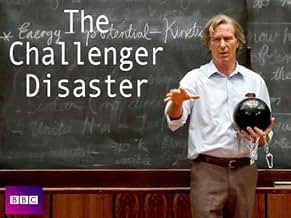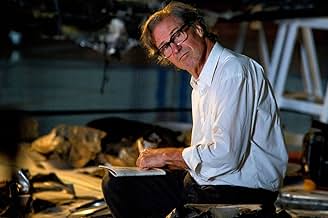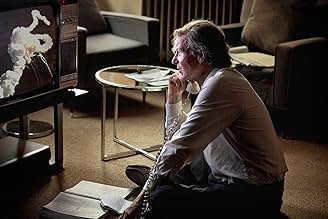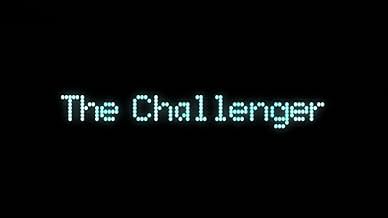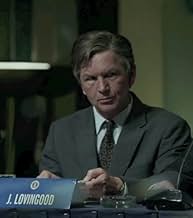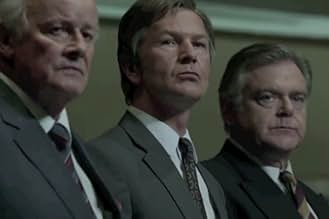Factual drama exploring the truth behind the space shuttle Challenger's 1986 disintegration.Factual drama exploring the truth behind the space shuttle Challenger's 1986 disintegration.Factual drama exploring the truth behind the space shuttle Challenger's 1986 disintegration.
- Awards
- 1 win & 2 nominations total
- Michelle Feynman
- (as Megan Young)
- Judson Lovingood
- (as Sean C. Michael)
- Director
- Writer
- All cast & crew
- Production, box office & more at IMDbPro
Featured reviews
*** 1/2 (out of 4)
Made-for-TV drama based on the investigation by Dr. Richard Feynman (William Hurt) in regards to the Challenger disaster that took place on January 28, 1986. THE CHALLENGER DISASTER is about as good as a movie produced for television can get. It features an amazing performance by Hurt, a story that is quite gripping and it all plays out like a well structured thriller that will have you on the edge of your seat even if the findings of the report are all well-known by this point. What really shocked me about this film is simply how terrific Hurt is. Hurt, at one time, was considered to be one of the greatest actors working but things in his personal life pretty much took all the spotlight and the attention on his skill went away. Watching him perform here was simply amazing because he really does give one of the best performances of the year and if this thing had been made for the theater then an Oscar-nomination would be guaranteed. I thought the performance was downright flawless as this character was so well-rounded and detailed that the actor simply took everything and nailed it. Feynman was battling cancer while also having to deal with the pressure of this case and watching Hurt play both things was simply divine. The supporting players are also extremely good with Bruce Greenwood, Brian Dennehy and Joanne Whalley all delivering strong work. Director James Hawes does a very good job at keeping the viewer on the edge of their seats as he really turns this into a strong thriller. I liked the way that he managed to make you understand the need for certain people to cover up what really happened and I think the film is fair in showing why many feared that the truth might lead to no more space missions. The entire film treats everyone with the highest amount of respect, which makes for a much better movie. THE CHALLENGER DISASTER is without question a highly entertaining film and it contains one of the best performances that you're going to see.
The film is based on the last of Feynman's autobiographical works "What Do You Care What Other People Think?" so it is told from his perspective. The film shows how Feynman was pointed in the right direction. However the story is more complicated. For example there was not time to mention the role of Roger Boisjoly of Morton Thiokol who wrote a damning report about the O-rings six months before the disaster. The report was ignored. He lectured on work-place ethics.
William Hurt is physically similar Richard Feynman and did incredibly well with his impersonation. You can see Feynman in action in videos of him lecturing to a lay audience in Auckland and judge for yourself. Feynman died one year and nine months after the publication of the Rogers Commission Report with his appendix, and sadly his wife Gweneth also died the following year.
Feynman was the critical independent factor which foiled such attempts when the Challenger exploded during take off in January 1986.
This factual account reveals Feynman was by chance adopted onto the investigative commission over the Challenger disaster at a time when he was critically ill. Unlike the rest of the commission members who had other agendas, Feynman approached the problem objectively and, through his popular demonstrations of physics for which he'd become famous, had the skill and passionate commitment to reveal the truth to the public. As he wrote in his report, 'For a successful technology, reality must take precedence over public relations, for nature cannot be fooled' Throughout this gripping drama you are taking the part of the underdog, frustrated at the increasing knowledge that the commission members, bar one or two, were driven by political agendas which meant the truth was trying to be covered up. Feynman represents the common man, and as such makes you part of the battle to foil the exasperating corruption.
William Hurt is magnificent playing Feynman, depicting non-conformist behaviour which is only tolerated because of his brilliance. I found his nuances of expression fascinating and wonderfully representative of how we, the public, would have reacted when faced with pompous authority attempting to control our behaviour. Brilliant stuff, and all the more telling because it is true.
At the time of the disaster, Feynman was teaching physics at the California Institute of Technology. One of his former students, a NASA insider, recommends the professor become involved with the commission. From the first, Feynman clashes with the Director of the commission Rogers (Brian Dennehy), who is at first more worried about NASA's reputation than finding the cause of the Challenger disaster. Feynman begins a bit of rogue investigative work which frustrates other members of the commission, who are worried that reputations and business contracts could be be jeopardized by the findings.
Feynman then befriends General Donald Kutyna (Bruce Greenwood), who turns out to be an invaluable ally in the investigation. Kutyna explains to Feynman that the politics surrounding such an investigation often becomes messy, even ugly. People try to veil the truth, often with lots of scientific jargon, fearing that reputations, positions, and even careers might be compromised if unflattering facts come into the spotlight. At the same time, since Feynman is an outsider, he is much more free to ascertain the truth than other members. Then the physics professor receives a strange message which says "it's just ivory soap". Late in the film, Feynman makes a fascinating presentation of his findings to the other commission members. After the credits, video footage of the real Feynman making the identical presentation is shown as a kind of epilogue or coda.
A compelling and thoroughly entertaining insiders' look into a commission of inquiry appointed by the US Government. While the need to find the truth is what the public expects, they don't often see the political shenanigans which often occur when such an investigation embarks on its task. The Warren Commission, the mishandled board of inquiry formed to investigate the assassination of President John F. Kennedy, made decisions which were above and beyond the goal of finding the truth, such as shielding crucial pieces of evidence from other board members for fear that such exposure would embarrass and/or infuriate the Kennedy family. (The Warren Commission's failures would fuel conspiracy theories for decades.) The Challenger Commission (or Rogers Commission) could have fallen into the same trap. However, because of the integrity of several of the members of the board, the truth of the Challenger disaster was finally revealed. And as a result, NASA made far-reaching improvements in its shuttle technology. Sadly, the Shuttle Disaster Commission was Feynman's last undertaking which received national attention. Feynman would die of cancer in 1988 at the age of 69.
Did you know
- TriviaWhen Feynman is talking to Bill Graham from his home office, you can see a California vanity plate that partially spells out "TOUVA" on a shelf. Feynman and his friend Ralph Leighton, who transcribed his adventures into the books "Surely You're Joking" and "What Do You Care What Other People Think?" had been on a quest to visit the remote Asian country of Tuva, a country all but inaccessible to Westerners in the late 1980s. Leighton obtained the plate for his car. Sadly, their last, best scheme to reach Tuva fell into place two weeks after Feynman died of stomach cancer.
- GoofsWhen Feynman visits the Shuttle factory, the flight deck interior is clearly that of a Boeing 747-200. You can see the flight engineer's panel and the four throttles on the centre console, also the windscreen layout gives it away.
- Quotes
Rogers: The other commissioners are just being respectful.
Richard Feynman: And you're saying I'm not? You understand the implications of the oxygen being activated? I do. The astronauts had to do that themselves. Which means they were ALIVE for at least some of those two minutes and thirty six seconds before they slammed into the ocean. Mr Rogers I'm an atheist, I personally doubt they're touching the face of God so I prefer to show my respect by finding the CAUSE of their appalling deaths and not stand around looking sad.
- ConnectionsFollows Challenger (1990)
Details
- Release date
- Countries of origin
- Language
- Also known as
- 73 Seconds: The Challenger Investigation
- Production companies
- See more company credits at IMDbPro

